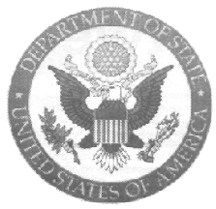The following column answers frequently asked questions about the immigrant visa process associated with adopted children.
Who can adopt?
To bring an adopted child to the United States from Guyana, you must be found eligible to adopt by the U.S. government. The U.S. government agency responsible for making that determination is the U.S. Citizenship and Immigration Services (USCIS) of the Department of Homeland Security,

Under the INA, a child who is adopted abroad while under the age of 16 and who has been in the legal custody of, and has resided with, his or her adoptive parent(s) for at least two years, may be the beneficiary of a U.S. Citizenship and Immigration Services (USCIS) I-130 petition (Petition for Alien Relative) and receive an immigrant visa in the IR-2 category.
What if I am an U.S. citizen who is unable to live abroad to satisfy the two-year requirement?
Most U.S. citizen prospective adoptive parents are unable to live abroad to satisfy the two-year requirement. In such cases, a separate process applies to children
adopted from non-Hague Adoption Convention countries, which includes Guyana. Such children must qualify as orphans—as defined by the INA—before they can be considered for U.S. permanent residence or citizenship.
Who is an Orphan?
The U.S. Citizenship and Immigration Services (USCIS) determines whether a child qualifies as an orphan according to U.S. law – not the law of a child’s country of residence. The Immigration and Nationality Act (INA) definition includes four key elements:
The child must either have no parents, or a sole or surviving parent who is unable to care for the child and who has, in writing, irrevocably released the child for emigration and adoption.
The child must be under the age of 16 at the time an I-600 adoption petition is filed on his or her behalf with USCIS. A child adopted at age 16 or 17 will also qualify, provided he or she is a birth sibling of another child who has been adopted by, or who is under age 16 and has been petitioned for adoption by, the same adopting parents.
The adopting parents must have completed a full and final adoption of the child or must have legal custody of the child for purposes of emigration and adoption in the United States.
The child has been or will be adopted by a married U.S. citizen and spouse jointly, or by an unmarried U.S. citizen at least 25 years of age, with the intent of forming a bona fide parent/child relationship.
What are the Immigrant Visa Classes for Orphans adopted in Guyana?
IR-3 visas are issued only after a full and final adoption has been completed abroad by both adopting parents; both parents physically see the child prior to or during local adoption proceedings; and the country in which the child resides does not require re-adoption in the United States. Children who are under 18 automatically acquire U.S. citizenship upon entry to the United States on IR-3 visas. In such cases, USCIS automatically sends Certificates of Citizenship without requiring additional forms or fees.
Where can I find more information regarding the immigrant visa process for adopting children in Guyana?
The following websites provide further information about overseas adoptions, specifically for U.S. citizens adopting a child in Guyana:
http://adoption.state.gov/country_information/country_specific_info.php?country-select=guyana http://www.uscis.gov/adoption
***
“Ask the Consul” is a fortnightly column from the U.S. Embassy answering questions about U.S. immigration law and visa issues. If you have a general question about visa policy please email it to us at AskGeorge@state.gov. We select questions every other week and publish the answers in Stabroek News and on our website at http://georgetown.usembassy.gov/ask-the-consul.html . Information about visas and travel can be viewed at http://georgetown.usembassy.gov, http://travel.state.gov, and at http://www.dhs.gov. Applicants are strongly encouraged to prepare their own documents and avoid third-party advice. U.S. Consular rules change frequently and non-US government advisors often provide inadequate or inaccurate information.
Other than the questions we select, we DO NOT respond to questions sent to Ask the Consul. Please contact the visa inquiries unit (email visageorge@state.gov or call 225-7965 between 8 am and 4 pm Monday through Friday) if you have questions about a specific case.





